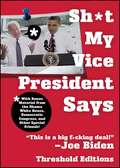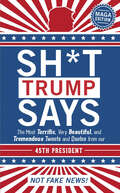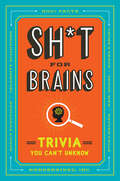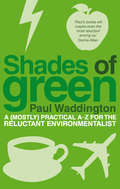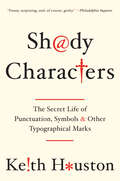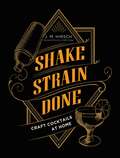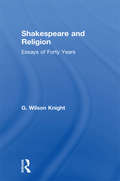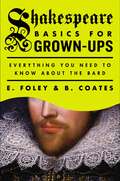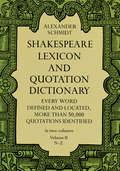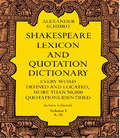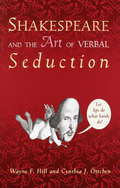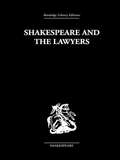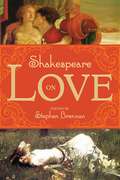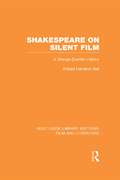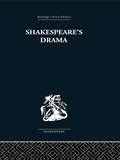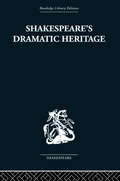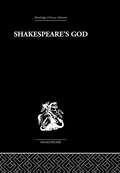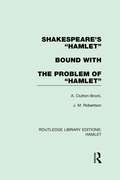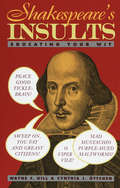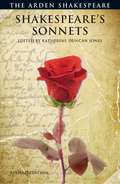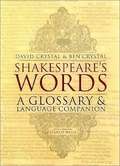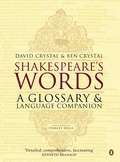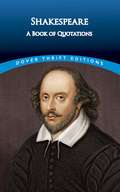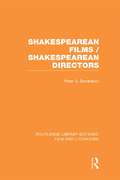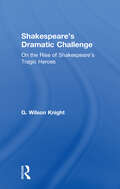- Table View
- List View
Sh*t My Vice-President Says
by Threshold Editions"Hillary Clinton is as qualified or more qualified than I am to be vice president of the United States of America. Quite frankly, it might have been a better pick than me." But would she have given us so many priceless verbal gaffes? George W. Bush has left the White House, but Vice President Joe Biden continues his hilarious legacy of memorable misstatements and spoken-word screw-ups. "Look, John (McCain)'s last-minute economic plan does nothing to tackle the number one job facing the middle class, and it happens to be, as Barack says, a three-letter word: jobs. J-O-B-S, jobs." "Stand up, Chuck, let 'em see ya." (to Missouri state senator Chuck Graham, who is in a wheelchair) Sh*t My Vice President Says captures every entertaining gem, with extra special commentary and a selection of winning quips from Biden's silver-tongued compatriots, such as Nancy Pelosi, Rahm Emanuel, and more!
Sh*t Trump Says: MAGA Edition
by Union Square & Co.&“I have a very good brain and I&’ve said a lot of things.&” Our 45th president has had plenty to say (and tweet) to the American people. His illustrious life has been full of words of &“wisdom&”—just imagine life without phrases like &“lock her up.&” This book is a collection of his greatest hits, from his days as a real estate investor to his most interesting (or confounding) presidential utterances.
Sh*t for Brains: Trivia You Can't Unknow
by Harebrained IncA compendium of truly outrageous, surprising, and (sometimes) gross facts.Did you know that Big Bird was originally supposed to fly on the doomed Challenger Space Shuttle? Or that smelling your own farts was considered a cure for the bubonic plague? Now those are things you can&’t unlearn. Born out of love for trivia and hatred for boring, bland facts, Sh*t for Brains is the ultimate wild ride of truth—from hilarious pop culture factoids to little-known insights from history, this twisted trivia book will make you laugh, cry, and maybe even cringe. A great gift for tweens, teens, and your bar trivia pals, Sh*t for Brains is not-so-average trivia for not-so-average people.
Shades Of Green: A (mostly) practical A-Z for the reluctant environmentalist
by Paul WaddingtonFew of us have what it takes to go 'all the way' on the green scale. Yet as fears about the food chain, climate change, plummeting biodiversity and the sustainability of our current lifestyles take hold, wouldn't it be good to be clear about our range of options?Whether you are pondering bicycles or baths, holidays or heating, pets or pasta, washing dishes or wine, Shades of Green is the book for you. It's an easy-to-use, A-Z guide which sets out your choices on a scale from 'completely green' to 'not even a little bit green'. No preaching. No finger-wagging.Whether you're an eco-warrior or a planet-trasher or, like most of us, something in between, Shades of Green will give you all you need to know so you can choose what suits you best. This is essential and often surprising reading.
Shady Characters: The Secret Life of Punctuation, Symbols, and Other Typographical Marks
by Keith Houston"An absolutely fascinating blend of history, design, sociology, and cultural poetics--highly recommended."--Maria Popova, Brain Pickings A charming and indispensable tour of two thousand years of the written word, Shady Characters weaves a fascinating trail across the parallel histories of language and typography. Whether investigating the asterisk (*) and dagger ( )--which alternately illuminated and skewered heretical verses of the early Bible--or the at sign (@), which languished in obscurity for centuries until rescued by the Internet, Keith Houston draws on myriad sources to chart the life and times of these enigmatic squiggles, both exotic (¶) and everyday (&). From the Library of Alexandria to the halls of Bell Labs, figures as diverse as Charlemagne, Vladimir Nabokov, and George W. Bush cross paths with marks as obscure as the interrobang (?) and as divisive as the dash (--). Ancient Roman graffiti, Venetian trading shorthand, Cold War double agents, and Madison Avenue round out an ever more diverse set of episodes, characters, and artifacts. Richly illustrated, ranging across time, typographies, and countries, Shady Characters will delight and entertain all who cherish the unpredictable and surprising in the writing life.
Shake Strain Done: Craft Cocktails at Home
by J. M. HirschRevolutionize the way you drink at home with simple recipes and common ingredients -- no obscure liquors or fussy techniques needed -- from the editorial director of Milk Street, J.M. Hirsch. Are you done with generic gin and tonics, mediocre Manhattans and basic martinis? You can use pantry staples and basic liquors to produce more than 200 game-changing craft cocktails worthy of a seat at the bar. Many cocktail books call for hard-to-find ingredients and complicated techniques that can frustrate home cocktail makers. Shake Strain Done shows a better way: If you can shake, strain, stir and turn on a blender, you can make great cocktails.No tedious secondary recipes hidden between the lines.No mysteries. You'll know what each drink will taste like before you pick up a bottle.No fancy equipment needed. A shaker, strainer and spoon are as exotic as it gets.The ingredients are mostly pantry and bar staples--things you already have on hand. Every drink is rated by its characteristics -- Warm, Refreshing, Sweet, Sour, Bitter, Fruity, Herbal, Creamy, Spicy, Strong and Smoky -- to help expand your horizons and find more drinks to love. These are drinks with the sophistication of a high-end speakeasy, minus the fuss, like: The Sazerac 2.0 - a spice cabinet update that takes the classic back to its originsA new White Russian that lightens the load with coconut water instead of creamA grownup Singapore Sling that's fruity without tasting like fruit punchA Scorched Margarita that uses the broiler to char those lemons and limesA feisty new Gin and Tonic in which black pepper is the star ingredientAnd plenty of originals, like the Pooh Bear. Butter, honey and bourbon? Yes, please! And Mistakes Were Made, for tiki time
Shakespeare & Religion V 7: Essays Of Forty Years
by Wilson KnightFirst Published in 2002. Routledge is an imprint of Taylor & Francis, an informa company.
Shakespeare Basics for Grown-Ups
by E. Foley B. CoatesAn essential guide to Shakespeare, from the international bestselling authors of Homework for Grown-Ups The Bard was so incredibly prolific that even most Shakespeare scholars would welcome the occasional refresher course, and most of the rest of us haven't even got a clue as to what a petard actually is. Fear not, the bestselling authors of Homework for Grown-Ups are here to help. For parents keen to help with their children's homework, casual theatre-goers who want to enhance their enjoyment and understanding, and the general reader who feels they should probably know more, Shakespeare Basics for Grown-Ups includes information on the key works, historical context, contemporaries and influences, famous speeches and quotations, modern day adaptations, and much, much more.
Shakespeare Lexicon and Quotation Dictionary (Third Edition)
by Alexander SchmidtIn more than 300 years of Shakespearean scholarship, only one book, the famous Shakespeare Lexicon and Quotation Dictionary, has investigated the meaning of every word that Shakespeare wrote. The lifetime work of Professor Alexander Schmidt of Königsberg, this book has long been the indispensable companion for every person seriously interested in Shakespeare, Renaissance poetry and prose of any sort, or English literature. It is really two important books in one. <p><p> Schmidt’s set contains every single word that Shakespeare used, not simply words that have changed their meaning since the seventeenth century, but every word in all the accepted plays and the poems. Covering both quartos and folios, it carefully distinguishes between shades of meaning for each word and provides exact definitions, plus governing phrases and locations, down to the numbered line of the Cambridge edition of Shakespeare. There is no other word dictionary comparable to this work. <p> Even more useful to the general reader, however, is the incredible wealth of exact quotations. Arranged under the words of the quotation itself (hence no need to consult confusing subject classifications) are more than 50,000 exact quotations. Each is precisely located, so that you can easily refer back to the plays or poems themselves, if you wish context.Other features helpful to the scholar are appendixes on basic grammatical observations, a glossary of provincialisms, a list of words and sentences taken from foreign languages, a list of words that form the latter part of word-combinations. This third edition features a supplement with new findings.
Shakespeare Lexicon and Quotation Dictionary: A Complete Dictionary Of All The English Words, Phrases, And Constructions In The Works Of The Poet (Third Edition)
by Alexander SchmidtIn more than 300 years of Shakespearean scholarship, only one book, the famous Shakespeare Lexicon and Quotation Dictionary, has investigated the meaning of every word that Shakespeare wrote. The lifetime work of Professor Alexander Schmidt of Königsberg, this book has long been the indispensable companion for every person seriously interested in Shakespeare, Renaissance poetry and prose of any sort, or English literature. It is really two important books in one. <p><p> Schmidt’s set contains every single word that Shakespeare used, not simply words that have changed their meaning since the seventeenth century, but every word in all the accepted plays and the poems. Covering both quartos and folios, it carefully distinguishes between shades of meaning for each word and provides exact definitions, plus governing phrases and locations, down to the numbered line of the Cambridge edition of Shakespeare. There is no other word dictionary comparable to this work. <p> Even more useful to the general reader, however, is the incredible wealth of exact quotations. Arranged under the words of the quotation itself (hence no need to consult confusing subject classifications) are more than 50,000 exact quotations. Each is precisely located, so that you can easily refer back to the plays or poems themselves, if you wish context.Other features helpful to the scholar are appendixes on basic grammatical observations, a glossary of provincialisms, a list of words and sentences taken from foreign languages, a list of words that form the latter part of word-combinations. This third edition features a supplement with new findings.
Shakespeare and the Art of Verbal Seduction
by Wayne F. Hill Cynthia J. ÖttchenDo you long to be seductive? Have a desire to be seduced? Then "let lips do what hands do" and put into practice the most enticing baubles of seduction ever written. Shakespeare and the Art of Verbal Seduction contains the Bard's best seducing lines to cajole, charm, and even proposition the object of your desire. Shakespeare is the master of persuasion. He induces the hardest of hearts to give up mind, body, and soul with a brilliant flash of words. Here they're collected for you, his little miracles of language, arranged in ten strategies for every stage of a love affair, from first encounter to the full throes of passion. Never again let your desire flounder in bad come-ons. Learn the art of seduction from the greatest seducer of all time, and get what you want. From the Trade Paperback edition.
Shakespeare and the Lawyers
by O Hood PhillipsFirst published in 1972. Shakespeare's writing abounds with legal terms and allusions and in many of the plays the concept and working of the law is a significant theme. Shakespeare and the Lawyers gives a comprehensive survey of what Shakespeare wrote about the law and lawyers, and what has been written, particularly by lawyers, about Shakespeare's life and works in relation to the law. The book first reviews the recorded facts about Shakespeare's life and works, and his connection with the Inns of Court. It then discusses legal terms, allusions and plots in the plays; Shakespeare's treatment of the problems of law, justice and government; his description of lawyers and officers of the law; his references to actual legal personalities; and his trial scenes. Two further chapters consider the criticisms that have been made of Shakespeare's law, and the contribution to Shakespeare studies by lawyers.
Shakespeare on Love
by Stephen BrennanWilliam Shakespeare is ubiquitous throughout the Western world as the master of the written word, and the above-quoted "Sonnet 18" is celebrated as one of the most exquisite love poems of all time. Love comes in all forms--friendly, familial, unrequited, and lustful--and impressively, the bard's canon works with them all. His views on love--whether they be amorous and passionate or obsessive and unsettling--are provocative to the mind and imagination. The modern reader will recognize poignant turns of phrase; though still used today, they originated from Shakespeare--known for inventing much of the modern English vocabulary. Shakespeare on Love draws from the entire Shakespeare canon: love sonnets, plays, and songs. Romeo & Juliet, Hamlet, A Midsummer Night's Dream, and countless others all have their place. In one complete volume, discover the lyrical, the funny, the lewd, and the idolatrous passages on love as composed by the most influential writer of the English language.Beloved excerpts featured in these pages include:Sonnet 43:All days are nights to see till I see thee,And nights bright days when dreams do show thee me.As You Like It:Who ever loved that loved not at first sight?Hamlet:Doubt thou the stars are fire;Doubt that the sun doth move;Doubt truth to be a liar;But never doubt I love.
Shakespeare on Silent Film: A Strange Eventful History (Routledge Library Editions: Film and Literature)
by Robert Hamilton BallIn 1899, when film projection was barely three years old, Herbert Beerbohm Tree was filmed as King John. In his highly entertaining history, Robert Hamilton Ball traces in detail the fate of Shakespeare on silent films from Tree’s first effort until the establishment of sound in 1929. The silent films brought Shakespeare to a wide public who had never had the chance to see his plays in the theatre. And Shakespeare gave the film makers an air of respectability that was badly needed by a medium with a reputation for frivolity. This work, first published in 1968, brings history to life with excerpts from scenarios, from reviews and from contemporary film journals, and with reproduction of stills and frames from the films themselves, including unusual shots of leading screen actors. This is a valuable source book for film experts, enhanced by full notes, bibliography and indexes; a fresh approach for Shakespeareans; and a vivid sketch of a world that has passed for all.
Shakespeare's Drama
by Una Ellis-FermorFirst published in 1980. This collection of essays by the first General Editor of the New Arden Shakespeare brings together the best of Ellis-Fermor's Shespearean criticism, in addition to outstanding essays on Coriolanus and Troilus and Cressida. Collected and edited by Kenneth Muir, the book is prefaced by an appreciation of Ellis-Fermor's work.
Shakespeare's Dramatic Heritage: Collected Studies in Mediaeval, Tudor and Shakespearean Drama
by Glynne WickhamShakespeare's Dramatic Heritage shows that the drama of Elizabethan and Jacobean England is deeply indebted to the religious drama of the Middle Ages and represents a climax, in secular guise, to mediaeval experiment and achievement rather than a new beginning. This is fully examined in terms of dramatic literature as well as in terms of theatres, stages and production conventions. The plays studied include: Richard II, A Midsummer Night's Dream, Hamlet, Macbeth, Coriolanus, The Winter's Tale and Marlowe's King Edward II.
Shakespeare's God: The Role of Religion in the Tragedies
by Ivor MorrisFirst published in 1972. Shakespeare's God investigates whether a religious interpretation of Shakespeare's tragedies is possible. The study places Christianity's commentary on the human condition side by side with what tragedy reveals about it. This pattern is identified using the writings of Christian thinkers from Augustine to the present day. The pattern in the chief phenomena of literary tragedy is also traced
Shakespeare's Hamlet bound with The Problem of Hamlet (Routledge Library Editions: Hamlet)
by A. Clutton-Brock J. M. RobertsonThis volume combines two classic works on Hamlet, first published in 1919 and 1922. The first book's original description says that it contains a theory which attempts to explain an everlasting problem - it insists that Hamlet is neither a failure not an accident, but a very great work of art. In a final chapter, the play is examined as an aesthetic document. It is a profoundly interesting and not unprovocative work. The second book reviews and attempts to resolve the most interesting debate of any Shakespeare play and presents proper method for investigating the genesis of the plays in this way.
Shakespeare's Insults: Educating Your Wit
by Wayne F. Hill Cynthia J. ÖttchenThe sharpest stings ever to snap from the tip of an English-speaking tongue are here at hand, ready to be directed at the knaves, villains, and coxcombs of the reader's choice. Culled from 38 plays, here are the best 5,000 examples of Shakespeare's glorious invective, arranged by play, in order of appearance, with helpful act and line numbers for easy reference, along with an index of topical scorn appropriate to particular characters and occasions.
Shakespeare's Sonnets (The Arden Shakespeare, Third Series)
by William Shakespeare Katherine Duncan-JonesThe author Katherine Duncan Jones explores the issues of sexuality to be found in poems of Shakespeare, making this a truly modern edition for todays readers and students. This revised edition has been updated and corrected in the light of new scholarship and critical thinking since its first publication.
Shakespeare's Words: A Glossary and Language Companion
by Stanley Wells David Crystal Ben CrystalA vital resource for scholars, students and actors, this book contains glosses and quotes for over 14,000 words that could be misunderstood by or are unknown to a modern audience. Displayed panels look at such areas of Shakespeare's language as greetings, swear-words and terms of address. Plot summaries are included for all Shakespeare's plays and on the facing page is a unique diagramatic representation of the relationships within each play.
Shakespeare's Words: A Glossary and Language Companion (Canto Classics Ser.)
by David Crystal Ben CrystalA vital resource for scholars, students and actors, this book contains glosses and quotes for over 14,000 words that could be misunderstood by or are unknown to a modern audience. Displayed panels look at such areas of Shakespeare's language as greetings, swear-words and terms of address. Plot summaries are included for all Shakespeare's plays and on the facing page is a unique diagramatic representation of the relationships within each play.
Shakespeare: A Book of Quotations (Dover Thrift Editions Ser. #Vol. 7)
by William ShakespeareShakespeare is without doubt the most quoted writer in English. His plays and poems comprise an inexhaustible source of memorable and often profound thoughts beautifully and concisely expressed. This remarkably affordable volume presents over 400 quotations conveniently arranged by topic: love, marriage, conduct and morality, truth, beauty, time, death, music, and more.Included are such timeless observations as: "All that glitters is not gold," "Brevity is the soul of wit," "How sharper than a serpent's tooth it is/ To have a thankless child"; "While you live, tell truth and shame the devil!"; "The very substance of the ambitious is merely the shadow of a dream," and many more. Romantic thoughts receive a particularly rich treatment; extensive selections on the subject of love include quotes from the plays ("The course of true love never did run smooth"; "Speak low if you speak love") and sonnets ("For thy sweet love remember'd such wealth brings,/ That then I scorn to change my state with kings"). Each quote bears a complete citation.Ideal for writers, speakers, students of literature, and any lover of Shakespeare's works, this inexpensive treasury lends itself admirably to a virtually endless number of uses, from casual browsing to designing personal greeting cards.
Shakespearean Films/Shakespearean Directors (Routledge Library Editions: Film and Literature)
by Peter S. DonaldsonOriginally published in 1990, this book brought a new rigor and subtlety to the interpretation of film adaptations of Shakespeare. Drawing on traditional literary analysis, psychoanalysis, and current film theory about gender and subjectivity, the author combines close readings of seven films with historical and biographical studies of the directors who made them. Offering substantial readings of Jean-Luc Godard’s controversial deconstructed King Lear and of Liz White’s independent African-American Othello, Donaldson also applies his provocative and contemporary point of view to more familiar films. He reads Olivier’s Henry V in relation to its treatment of sexual difference; Olivier’s Hamlet in part as an expression of the director’s childhood sexual trauma; Kurosawa’s Throne of Blood as an allegory of the relationship between Western and Japanese cinema; and Zeffirelli’s immensely popular Romeo and Juliet in the light of its powerful homoerotic subtext. With striking perspectives on Shakespeare, on the movies as an expressive medium, and on the complex processes of cultural change, this is timeless useful reading for teachers and students of film and literature.
Shakespeares Dramatic Chall V: On The Rise Of Shakespeare's Tragic Heroes
by Wilson KnightFirst published in 2002. Routledge is an imprint of Taylor & Francis, an informa company.
